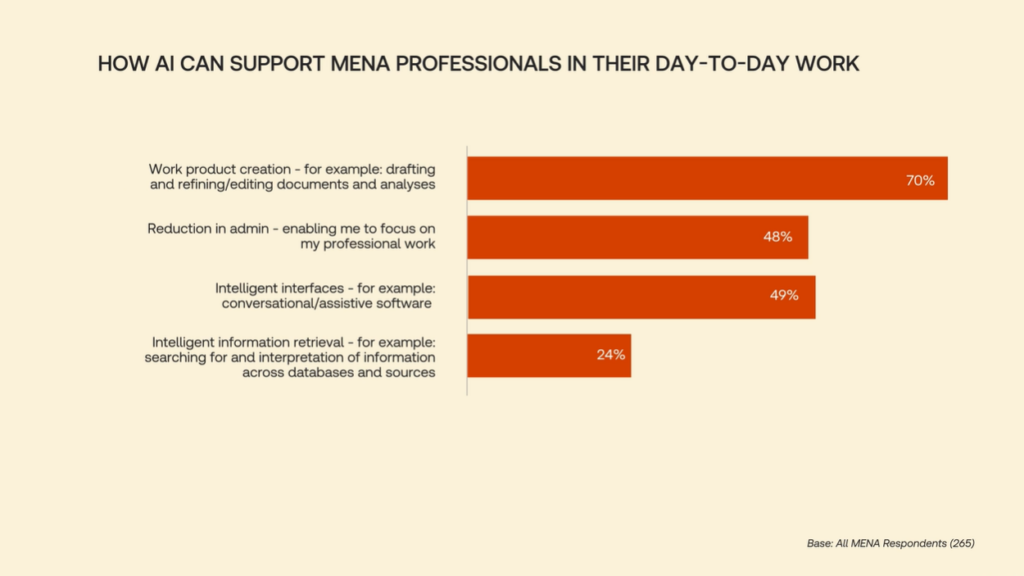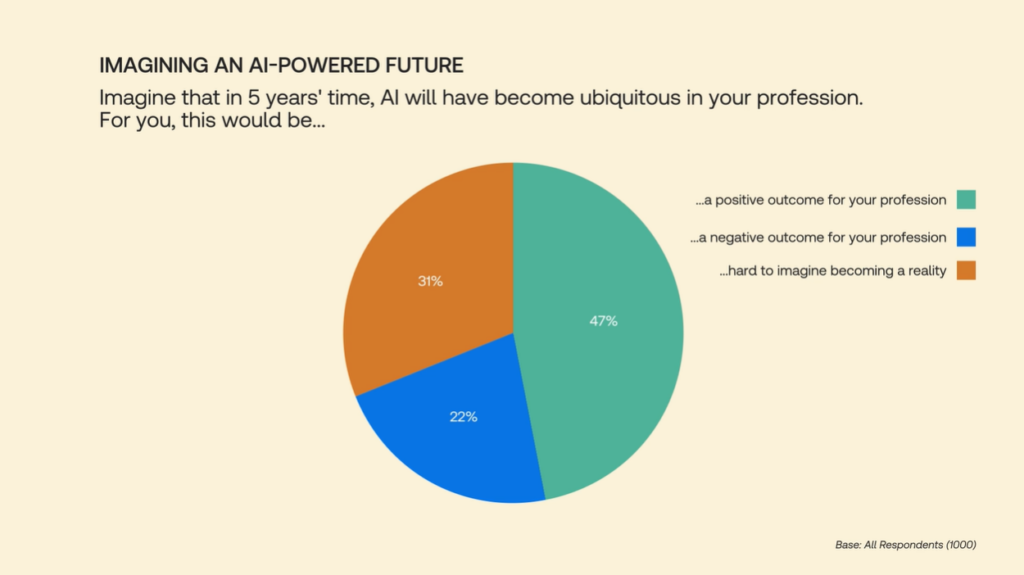The prolific use of artificial intelligence (AI) and large language models will have a ‘transformational’ impact on professionals based in the Middle East and North Africa (MENA) over the next five years, a Thomson Reuters survey has found. Professionals in the region, rated AI as the trend most likely to transform their roles by 2029. In total, 86% expect widespread adoption of AI to have a significant impact on their profession.
“AI is transforming the world of work across professions and regions,” commented Jackie Rhodes, Managing Director for Asia & Emerging Markets at Thomson Reuters. “AI is clearly a once-in-a-career opportunity impacting the growth of firms and companies around the world.”
Between December 2023 and February 2024, Thomason Reuters surveyed 1,000 professionals worldwide, of which nearly 300 were based in the MENA region. As part of the market research, individuals in legal, risk, compliance, tax and global trade functions were asked how AI may affect the future of their profession. The findings are published in the Future of Professionals Report – Asia & Emerging Markets Edition.
Respondents ranked an ‘explosion in data volumes’ as the second-biggest trend (92%) to affect MENA professions over the next five years. Among these, 22% said it would have a ‘transformational’ impact, while 38% believe it will have a high impact. These findings reflect the increasing pressure that professionals are under worldwide. Among global respondents, 88% ranked increasing data complexity among the top-three expected trends, underscoring the need to manage growing data across all sectors effectively.
Purpose-built legal technology with AI capabilities can enable professionals to manage rising data volumes over the coming years. Tailored legal solutions can rapidly analyze huge volumes of complex data within custom parameters and secure systems. It can facilitate informed decision making by senior leaders and enhance business agility.
Millennials who rise through the ranks are set to leverage AI innovations to support business growth. MENA respondents expect the ascension of millennials to leadership roles to be the biggest trend affecting their profession by 2029. In total, 94% said the increase of millennial leaders would have a significant impact on their profession. Similarly, 92% of global respondents also ranked this as the top upcoming trend.

AI use cases aligned with MENA business priorities
The newly released Future of Professionals Report shows that digital transformation remains high on business agendas. Nearly half of MENA respondents (47%) said their department’s top priority over the next 18 months will be keeping pace with their organisation’s digitisation efforts. This aligns closely with global data, where 46% prioritise digitalisastion as their highest priority.
These business strategies reflect national efforts to increase digitisation and leverage AI across sectors. Digital transformation is a core component of long-term governmental strategies across the region, including in the UAE, Saudi Arabia, Kuwait, Egypt, Oman and Jordan. Several MENA jurisdictions also have national AI strategies, including Qatar, Bahrain, Kuwait, Saudi Arabia, the UAE, Oman, Egypt and Jordan.
The UAE , for example, actively supports technological innovation. The government’s 2025 digital strategy includes plans to leverage emerging technologies and make data-driven policy decisions. The jurisdiction also benefits from a Cognitive, Artificial Intelligence and Robotics Laboratory, which has been designed to serve the UAE’s national priorities. The UAE aims to become a global leader in AI by 2031, by leveraging the power of AI-driven solutions to develop transformative opportunities across sectors.
Innovative AI strategies that align with business priorities could revolutionise many organisations in the coming years. AI-powered legal technology has the potential to help MENA professionals achieve their second and third-highest priorities: identifying and mitigating emerging risks (43%), and monitoring legal and regulatory change (40%). Global respondents also ranked these among their top three priorities, demonstrating the rising regulatory complexity worldwide.
Beyond risk and regulatory Management, MENA professionals have other opportunities to leverage AI to achieve business priorities. These include:
- Improving the quality of advice they deliver (38%)
- Increasing internal efficiencies (35%)
- Enabling business expansion into new geographical markets (33%)
- Supporting the development of new products and/or services (32%)
- Improving employee engagement within their department (32%)

Potential impact of AI on MENA professionals” day-to-day work
Experienced professionals have long recognised the power of purpose-built technology to support their day-to-day work. It can drive efficiencies, increase transparency and improve workflows. The integration of AI promises to deliver even greater opportunities to enhance productivity.
When asked to consider the areas in which they would most like AI to support their day-to-day work, the overwhelming majority of MENA professionals (70%) ranked work product creation as their top priority. The desired AI functionality may include drafting, refining and editing documents and analyses.
MENA professionals are also seeking intelligent AI-powered interfaces that can support their work. Nearly half (49%) of MENA professionals expect these solutions, which may include conversational assisted tools, to enhance day-to-day performance. Close behind are AI tools that can reduce admin (48%) and enable a greater focus on professional work.

What MENA professionals hope AI will bring to their department
When asked about their biggest hopes that AI will bring to their profession, MENA respondents were much more optimistic than their global counterparts. Two in five (40%) of MENA professionals said they hoped AI would free up their time to focus on strategic, highe-level work, compared to 31% worldwide.
This shows a much greater awareness in MENA of the potential for AI to support professionals in doing what they do best. It can free up time spent on labor-intensive manual tasks that are necessary but tedious. This can, in turn, enable MENA professionals to transform their client services (20%) — the second biggest hope for AI’s impact on their professions. Respondents also hope that it will increase productivity (15%) and enable the evolution of new business models and service offerings (15%).

MENA professionals positive about an AI-powered future
There are infinite possibilities for how professionals may leverage AI to innovate and support business growth. However, the Thomson Reuters’ market researchsurvey insights shows that market sentiment about AI’s future prevalence is mixed. Approximately half of MENA respondents (47%) expect it have a positive impact on their profession by 2029, a similar level to global respondents (53%).
Nearly a third (31%) of MENA professionals are skeptical about AI becoming ubiquitous, a much higher proportion than their global counterparts (20%).
These concerns may be partly driven by well-known quality risks with the outputs of public Gen AI tools such as ChatGPT. However, certain AI-powered expert solutions that have been designed for professionals have already overcome these limitations. They deliver the many benefits of AI within a secure, reliable and customisable system.
Professionals should carefully assess any solution being considered for their department. This should include testing the software for potential use cases, to help determine its future value to the business. They should also assess the vendor’s reputation for ongoing customer support among comparable organisations. This is critical in assessing if the vendor will be a valuable partner in the long-term success of your business.

For a deeper dive into AI’s potention to revolotionise MENA professions by 2029, refer to the comprehensive Insights in the Future of Professionals Report – Asia & Emerging Markets Edition.


